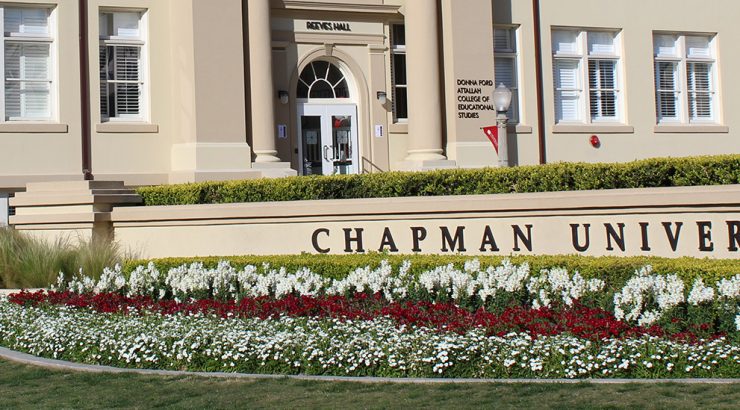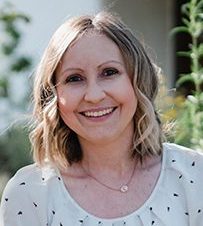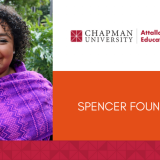Meet Our Newest Faculty New Attallah Faculty Bring Focus on Diverse, Inclusive Learning Environments
August 31, 2020
The Attallah College of Educational Studies is pleased to welcome two new faculty to the Integrated Educational Studies (IES) undergraduate program this fall: Stephany Cuevas, Ed.D., Assistant Professor of Education, and Jillian Wood, Ph.D., Assistant Professor of Education and Coordinator of the Integrated Educational Studies program.
With focuses on equity in learning environment and education in the broadest sense, Dr. Wood and Dr. Cuevas are natural fits for the Integrated Educational Studies program, which hosts both the BA in IES and the accelerated, five-year bachelor’s plus MA in Curriculum and Instruction (MACI) degree pathways.
“Our new IES faculty bring valuable expertise on education in both traditional school settings and beyond. Rethinking educational equity and access from both a schools and communities perspective, as well as a lifelong endeavor extending far beyond formal schooling, is at the heart of the IES program,” said Attallah College Interim Dean Roxanne Greitz Miller.
Jillian Wood
Dr. Jillian Wood’s research focuses on adult learning, equity in the workplace, particularly in higher education, and the areas and ways they intersect.
“I have a passion for lifelong learning, which led me to higher education,” says Dr. Wood. “Seeing that implicit bias and discrimination occurs in learning institutions, where we should be examples in these areas, inspired me to study how we can ensure equity among higher education institutions. I truly believe everyone should feel safe at home, at school, and in their work. However, this can’t happen if systemic sexism, racism, homophobia, and so forth exist.”
Understanding why equity issues exist for marginalized groups in organizations is an important step to making society as a whole more equitable, Dr. Wood explains. Understanding the uniqueness of adult learners and what inspires them is key to building an inclusive learning environment and motivating learners. This is true in both traditional school settings and manager/employee relationships.
Before joining Attallah College, Dr. Wood taught business writing and communications at California State University, Fullerton. While earning her Ph.D. in Education at Chapman, she also served as the Associate Director of Operations in Chapman’s Argyros School of Business and Economics and a part-time instructor in Attallah College’s IES program.
One of the reasons she loves Attallah’s IES program is because it embraces the educator and leader in all our students, regardless of what industry they plan to enter. Having democratic, ethical leaders coming from our programs gives her hope that we can become a more equitable society for our future generations.
“I’m excited to be in the IES program full-time and look forward to working with our students,” said Dr. Wood. “We might be starting the fall 2020 semester remote, but I’m ready to build a fun and exciting learning community with our students.”
Dr. Wood explains she became passionate about adult learning during her Ph.D. program at Chapman and while teaching adult learning theory. She feels this concept is especially important during our current COVID-19 crisis.
“As educators, we need to connect the learner with the material they are learning. We need to build motivation by letting adult students see why the subject is important and how it connects to their own interests,” said Dr. Wood. “This is especially important in this current remote environment and building on adult learning techniques is more important than ever to ensure we are fostering community with and for our students.”
Stephany Cuevas

Dr. Stephany Cuevas
Prior to obtaining her doctorate from the Harvard Graduate School of Education, Dr. Stephany Cuevas worked with predominantly Spanish-speaking Latinx parents in the Bay Area. They were looking for help understanding the college-application process, she explains. Most had migrated to the United States, and many had not attended college themselves. They were unfamiliar with the American school system but were very eager to support their children in their college-going aspirations.
In addition to her personal journey with her own parents, those experiences have helped direct her work in higher education. Dr. Cuevas’ research looks at the importance and potential of family engagement in postsecondary access and success for first-generation, Latinx students, with a special focus on immigrant families and the unique challenges faced by undocumented parents. Her work demonstrates how essential the partnerships between schools and families are, particularly for students’ higher education aspirations.
“When schools and families work together, students thrive,” said Dr. Cuevas. “Ideally, my work will encourage educators and school spaces (both secondary and higher education) to find ways to partner with students’ families in order to promote student success and well-being.”
Dr. Cuevas’ current study explores institutions’ existing parent engagement practices and how Latinx parents experience them. Earlier research on parental engagement in higher education was limited to the experiences of middle- and upper-class white parents. With such a narrow focus, institutions are inadvertently overlooking the ways spaces, programming, and interactions may be excluding low-income parents, parents of first-generation students, and parents of color.
This fall semester, Dr. Cuevas will be teaching IES 206, Schools in Society. She is excited to join the IES program and engage in projects that center students, their families, and communities.
“The IES program’s focus on socially minded work and the notion that education does not only happen in school-based settings is so important,” said Dr. Cuevas. “I am looking forward to fostering discussions about what makes a ‘good’ school and how we strive for socially just educational spaces.”



